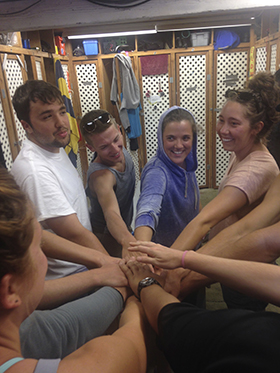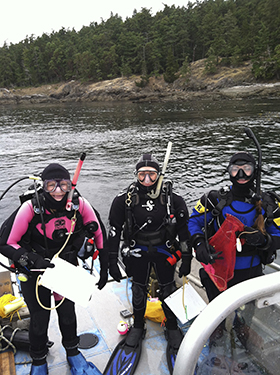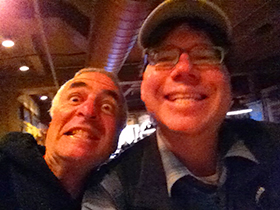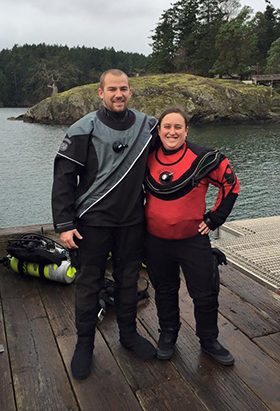UW's 2016 Scientific Diving Course at FHL
By Pema Kitaeff
University of Washington researchers have been conducting work underwater since the early days of SCUBA diving, throughout the 50’s, 60’s and 70’s. Only recently — since 2010 — has UW offered an opportunity to obtain a scientific diving certification in an intensive two-week summer workshop at Friday Harbor Labs.
 2015 Scientific Dive class photo from the pool session. Back row, L to R: Kate Hargenrader, Julian Campillo-Luna, Alissa Rickborn, Olivia Graham, Pema Kitaeff (instructor). Front row, L to R: David DuBose, Kalloway Page, Alex Lowe (T.A.), Aaron Galloway (instructor), Drew McWhirter.
2015 Scientific Dive class photo from the pool session. Back row, L to R: Kate Hargenrader, Julian Campillo-Luna, Alissa Rickborn, Olivia Graham, Pema Kitaeff (instructor). Front row, L to R: David DuBose, Kalloway Page, Alex Lowe (T.A.), Aaron Galloway (instructor), Drew McWhirter.
The UW was one of the first organizational members in the American Academy for Underwater Sciences (AAUS), which is the standard-setting body for scientific diving in this country. AAUS standards require a minimum of 100 hours of training in order to qualify as a full scientific diver and that’s what the intensive Scientific Dive Course at FHL provides. This training includes certifications in Basic Life Support & Oxygen for SCUBA emergencies, Rescue diving, and Enriched Air/Nitrox use; it also certifies students to operate the motorboats at FHL. The core of the workshop is to provide training in scientific diving methods that is both theoretical and applied by supporting ongoing FHL research.
 2015 students hyping in the dive locker.
2015 students hyping in the dive locker.
L to R: Julian C.L., Ben Rubinoff, Kate H., Olivia G.
 2014 students Hanna Jones (middle) and Laurel Speed (right) prepare for a dive at Katie Dobkowski's (left) research site.
2014 students Hanna Jones (middle) and Laurel Speed (right) prepare for a dive at Katie Dobkowski's (left) research site.
Some past students have gone on to work as scientific divers during graduate level studies either at UW or at other institutions around the world. Several past scientific diving students have gone on to become Diving Safety Officers, technicians, or other types of diving professionals. And several recent students are still diving at FHL and UW, either on research of their own or helping to support other projects.
 Jim Nestler (DSO @ Walla Walla University) and Nate Schwarck (DSO @ Western Washington University) assisted with the 2014 & 2015 classes and are much more serious underwater.
Jim Nestler (DSO @ Walla Walla University) and Nate Schwarck (DSO @ Western Washington University) assisted with the 2014 & 2015 classes and are much more serious underwater.
This year’s 2016 intensive Scientific Dive Course will be held from August 15-27th and it has attracted the largest number of applicants we’ve received since we began running this course. Because of its popularity, the UW Dive Safety Office will be discussing ways to offer a bigger variety of scientific diving courses in the future.
 Will Love (DSO @ UW) & Pema Kitaeff (DSO @ FHL) near FHL's dive elevator. Photo credits: Pema Kitaeff.
Will Love (DSO @ UW) & Pema Kitaeff (DSO @ FHL) near FHL's dive elevator. Photo credits: Pema Kitaeff.
Divers-in-training this year will assist graduate students Katie Dobkowski and Christopher Wells with their ongoing research involving bull kelp ecology and anemones, respectively. They’ll also work with post-doc Colette Feehan on her work with kelp and urchins, and support ongoing work with eelgrass.
This course has had a tradition since it started of inviting Dive Safety Officers from other AAUS programs to assist in training our students, and on San Juan Island we’re fortunate to have a destination that attracts such highly-qualified professionals to visit. This year’s course will host Dive Officers Nathan Schwarck from WWU’s Shannon Point Marine Center, Alan Verde from the Maine Maritime Academy, and Kevin Buch from Oregon State University. Finally, this course will also be the first at UW to be co-instructed by the new UW Diving Safety Officer, Will Love, who started at his post in November 2015.
We’re excited to turn out a new crop of enthusiastic and well-prepared scientific divers this summer! Any questions about this course can be directed to UW Diving Officers Will Love, wlove@uw.edu, and Pema Kitaeff, pema@uw.edu.



